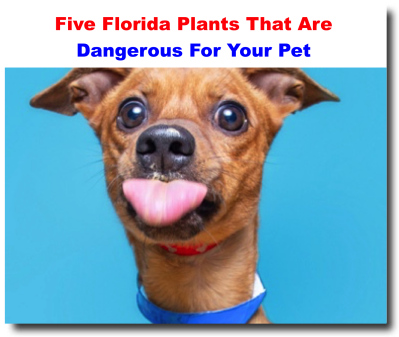Five Florida Plants That Are Dangerous For Your Pet
- Tweet

Five Florida Plants That Are Dangerous For Your Pet
Unfortunately, the beauty of your yard or garden can cause a trip to the Animal Hospital emergency room for an unexpected nibbler. Although there are hundreds of species of plants that commonly grow in Florida, only a small percentage are harmful to your pet. If you don't know the plants that grow in your yard, now is a good time to browse the Internet for pictures.
Listed below are a five (5) of the more common culprits when it comes to dangerous plants that your cat or dog may find appealing in our area:
AZALEAS - These plants cover the South and provide blankets of color every spring. However, only consuming a few leaves can lead to a life-threatening condition where your pet could fall into a coma or possibly die without immediate veterinary care. Symptoms include vomiting, diarrhea and excessive drooling.
OLEANDER - This versatile shrub can be found everywhere throughout our coastal landscapes. A hardy plant with bright flowers is considered one of the most poisonous plants in the world. Ingesting flowers or leaves can lead to severe vomiting, a slowing heart rate or death.
SAGO PALM - Not only do you find sago palms in lots of north Florida yards, many residents grow the popular palm indoors as a potted plant. Ingesting the leaves or seeds (which can be appealing to pets) can cause vomiting, bloody stools, damage to the stomach, liver failure or death.
LILIES - Most pet owners have heard that lilies are dangerous for pets, especially cats. Although all lilies should be avoided, Tiger lilies, Day lilies, Asiatic lilies, Easter lilies and Japanese Show lilies are highly toxic to felines. If your cat is seen chewing on any part, you should seek immediate veterinary care.
BULB PLANTS - The bulb buried below the ground can be overwhelmingly appealing to dogs that like to dig. Since the toxic alkaloids found in these plants, concentrates in the bulb, chewing on or ingesting small pieces can cause tissue irritation that results in profuse drooling, vomiting, diarrhea or more severe changes in heart rate or breathing.
For a more complete list of the 136 pet-harmful indoor and outdoor trees, shrubs and plants, visit the Poisonous Plants page of the ASPCA website. It is also important to remember that consumption of any plant material may cause gastrointestinal upset or vomiting for your cat or dog. If you believe your animal may have ingested a poisonous substance, contact your veterinarian or the APCC 24-hour emergency poison hotline at (888) 426-4435.
ref no:35885
Please send questions about this website to webmaster
Terms of Use / Legal Disclaimer / Privacy Statement
Site Designed and Managed by MacBusiness Consulting
